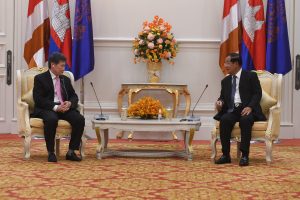Current Association of Southeast Asian Nations (ASEAN) chair Cambodia has announced that Myanmar’s military junta will not be invited to an upcoming meeting of the bloc’s foreign ministers, Voice of America’s Khmer service reported yesterday.
Cambodian Foreign Ministry spokesperson Chum Sounry told the media outlet that due to the junta’s lack of implementation of ASEAN’s Five-Point Consensus peace plan, Wunna Maung Lwin would not attend the ASEAN Foreign Ministers’ Retreat on February 16-17.
“Since there is little progress in the implementation of the Five-Point Consensus, ASEAN member states find it hard to reach a consensus to invite [the junta’s] foreign minister to participate in the Retreat,” Sounry told VOA Khmer. “Thus, we have asked Myanmar to send a non-political representative instead.”
The decision marks a stiffening of Cambodia’s position on the crisis in Myanmar and its return to the harder line position established by ASEAN under last year’s chair Brunei. This culminated in the Myanmar military government being disinvited from the bloc’s summit in October, for its lack of effort at implementation of the Five-Point Consensus, which includes a cessation of violence and calls for peaceful dialogue involving “all parties.”
Shortly after assuming the chairmanship, Cambodia’s Prime Minister Hun Sen expressed his intention to engage directly with Myanmar’s junta, and undertook a controversial trip to Myanmar at the start of January for talks with coup leader Senior Gen. Min Aung Hlaing. He also suggested that the junta be included in ASEAN meetings.
Critics of Hun Sen’s go-it-alone diplomacy accused him both of conferring de facto legitimacy on Myanmar’s military administration, breaking ASEAN’s brittle unity on the country’s crisis, and squandering what little leverage ASEAN had over the junta without securing any meaningful concessions in return. Indeed, in the days after Hun Sen’s visit, as if to dramatize its contempt for ASEAN opinion, the Myanmar air force launched air strikes and other violent reprisals on anti-coup resistance forces.
In the weeks after his visit, four Southeast Asian nations – the Philippines, Malaysia, Singapore, and Indonesia – publicly stated that junta participation in ASEAN meetings should be strictly conditioned on progress toward the implementation of the Five-Point Consensus. Intra-ASEAN discontent also likely contributed to Cambodia’s decision to postpone the Foreign Ministers’ Retreat, which was due to be held last month, after some foreign ministers expressed “difficulties” in attending, as a veiled protest against Cambodia’s intention to invite Wunna Maung Lwin to the informal gathering.
Cambodia’s Foreign Ministry now seems to have gravitated back to ASEAN’s former consensus position, expressing (by ASEAN standards) a surprisingly robust definition of what “progress” on the Five-Point Consensus would entail. In his interview with VOA Khmer, Chum Sounry said that Cambodia wished “to see more commitment from Myanmar and others to end violence through a ceasefire agreement, to kick-start a dialogue process that involved all parties concerned, and to allow access to political detainees.” He also said the junta should “enable and facilitate access of humanitarian assistance.”
As the VOA Khmer report pointed out, the decision was not entirely surprising given that Hun Sen first acknowledged the existence of the National Unity Government (NUG) during subsequent calls with ASEAN counterparts.
This newfound unity was crystallized in an ASEAN Chairman’s Statement that Cambodia released yesterday to mark the anniversary of the Myanmar coup, in which the bloc’s member states “underlined the urgency of the immediate cessation of violence” and stated that “durable peace and national reconciliation can be achieved only through an inclusive political solution that is Myanmar-owned and Myanmar-led and involving all parties concerned.”
Why did Cambodia change course? It probably did so to preserve ASEAN’s unity and consensus on the Myanmar issue. But the decision also reflects a recognition that Cambodia did not have political support for its chosen approach to Myanmar’s crisis, and that refusing to take the concerns of other ASEAN member states seriously would effectively leave its chairmanship stalled at the starting gate.
This is a particularly important consideration for Cambodia’s government, which is seeking to expunge the bad reputation that it acquired during its 2012 chairmanship, when it was accused of blocking a consensus statement on the South China Sea at Beijing’s behest. It is also important personally for Hun Sen, who is presiding over his third and likely final chairmanship of ASEAN, and is no doubt seeking to go out on a high note. Indeed, it was this consideration that likely prompted his proactive diplomatic approach to Myanmar in the first place.
While Cambodia’s course shift is a good sign for ASEAN unity, it leaves unresolved the question of the Five-Point Consensus itself, and whether it is adequate to the needs of the crisis. At the time that it was agreed at a special summit last April, some opponents of the junta criticized it for its relative caution, and questioned whether negotiations and dialogue with the military – the core of the Consensus – were possible or even desirable.
With neither Myanmar’s junta nor its multifarious opponents showing any inclination to negotiate – for arguably sound reasons in the case of the latter – progress on ASEAN’s peace plan will probably have to await significant shifts in the local political situation.
































